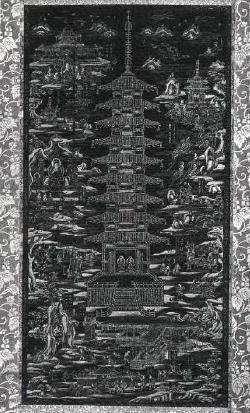On Paying for and Freeing Turtles and Being Rewarded Immediately and Saved by Them
![]()
 | Once, in going to the capital to exchange his belongings for gold and paints, the master reached the port of Naniwa. He happened to sea a seaman selling four big turtles, and he advised people to buy them and set them free. After that he rented a boat and boarded it with two acolytes to cross the sea. Late at night, the sailors, filled with greed, threw the acolytes into the sea near Kabanejima, in Bizen, and turned to him saying, "Quick, into the sea with you!" The monk tried to reason with them, but they would not listen. Finally, after making a vow, he sank into the water. When the water came up to his waist, he felt a stone supporting his legs. In the morning light he found that he was being carried by the turtles. They left him on the beach of Bitchu after nodding to him three times. It seems that the turtles which had been set free came back to repay his kindness. |